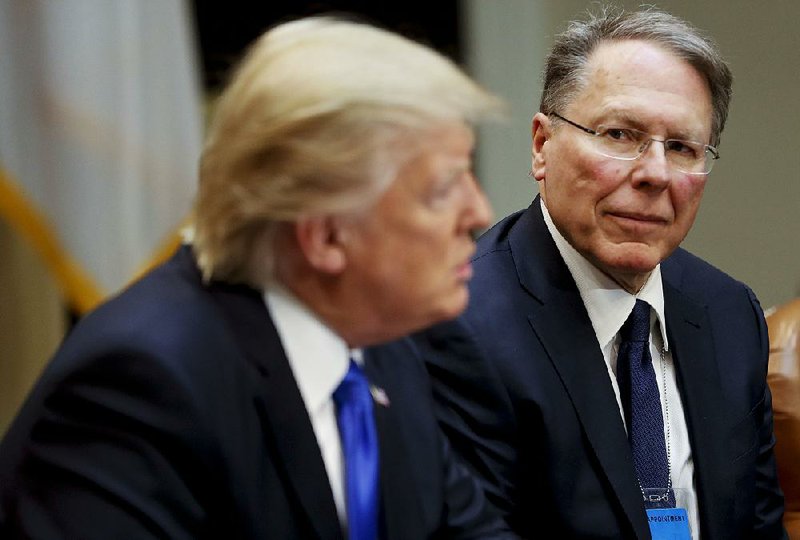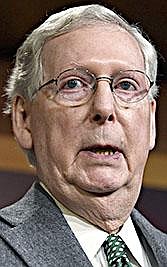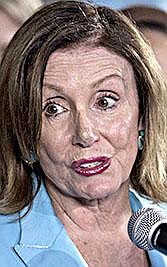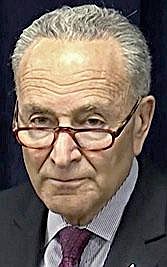More than 200 mayors -- including a half-dozen whose cities have experienced recent high-profile mass shootings -- wrote to Senate leaders Thursday, urging the lawmakers to reconvene to pass legislation strengthening background checks for gun buyers.
"The tragic events in El Paso and Dayton this weekend are just the latest reminders that our nation can no longer wait for our federal government to take the actions necessary to prevent people who should not have access to firearms from being able to purchase them," said the letter, signed by 214 mayors, including more than a dozen Republicans.
Those who signed include El Paso, Texas, Mayor Dee Margo, a Republican, and Dayton, Ohio, Mayor Nan Whaley, a Democrat. Two shootings left 31 dead in their two cities over the weekend.
The mayors of several other cities that have experienced mass shootings in recent years were also on board, including those of Annapolis, Md.; Orlando, Fla.; Parkland, Fla., and Pittsburgh.
Little Rock Mayor Frank Scott Jr. and Fayetteville Mayor Lioneld Jordan were among those who signed the letter.
Scott said that although he's a "strong supporter" of the Second Amendment, he thought the bipartisan push to increase background checks "shouldn't be too much of an issue" in these times and that he tries to be as bipartisan as possible.
The mayors are asking the Senate to return from an August recess to pass two bills that were approved earlier this year by the Democratic-led House but that have not advanced in the Republican-led Senate.
Earlier this week, Senate Majority Leader Mitch McConnell, R-Ky., issued a statement saying Senate Republicans were prepared to "do our part" to address mass shootings.
But on Thursday, McConnell said the debate on expanded background checks will be "front and center" in the Senate when it reconvenes next month.
The Republican leader said on a Kentucky radio station that President Donald Trump called him Thursday morning, and they talked about several ideas. The president, he said, is "anxious to get an outcome and so am I."
"Background checks and red flags will probably lead the discussion," the Senate leader said, referring to legislation that allows authorities to seize firearms from anyone deemed a threat to themselves or others.
Although he has been under pressure to call senators back to Washington from their summer recess to work on gun measures, he rejected that idea, saying it would just lead to senators "scoring points and nothing would happen."
Instead he wants to spend the August recess talking with Democratic and Republican senators to see what's possible.
"What we can't do is fail to pass something," McConnell said. "What I want to see here is an outcome."
"I think the urgency of this is not lost on any of us because we've seen too many of these horrendous acts," he said.
Shortly after McConnell spoke, the head of the National Rifle Association said it opposes any legislation that "unfairly infringes upon the rights of law-abiding citizens" and says proposals being discussed in Congress would not have prevented the mass shootings in Texas and Ohio.
NRA chief Wayne LaPierre said in a rare public statement Thursday that some federal gun-control proposals "would make millions of law-abiding Americans less safe and less able to defend themselves and their loved ones."
LaPierre says the NRA supports "real solutions" to the epidemic of gun violence but opposes "soundbite solutions" that fail to address root problems or confront criminal behavior.
Meanwhile, House Speaker Nancy Pelosi on Thursday asked Trump to use his constitutional powers to call the Senate back into session immediately to consider House-passed legislation expanding federal background checks for gun sales.
Pelosi told Trump in a letter that he and Congress "have an opportunity to work in a bipartisan way to pass gun violence prevention background checks," despite McConnell's longstanding opposition.
After he received the letter, Trump called Pelosi and Senate Minority Leader Charles Schumer individually to discuss gun legislation.
In a joint statement, the leaders said they told Trump that the best way to address gun violence is for the Senate to take up and pass the House-passed bill. They said Trump "gave us his assurances that he would review the bipartisan House-passed legislation and understood our interest in moving as quickly as possible to help save lives."
In late February, the Democratic-led House approved the first major new firearms restrictions to advance in a generation. The proposed legislation would amend federal gun laws to require background checks for all gun sales and most gun transfers.
Federally licensed dealers are required to run background checks on people who buy guns, but private sellers who are not federally licensed are not.
Under the bill, private parties would have to seek out federal licensees to facilitate gun deals.
The next day, the House passed a separate bill that would extend the time for the government to complete a background check on someone trying to buy a gun from a licensed dealer before the sale can go through.
Trump had threatened to veto the two bills, saying they do not sufficiently protect the Second Amendment rights of gun owners.
Since the weekend shootings, however, Trump has expressed a new openness to considering background checks.
Speaking to reporters Wednesday, he said there "was great appetite for background checks" and that he was "looking to do background checks." He did not specifically mention the House-passed bills.
Information for this article was contributed by John Wagner of The Washington Post; by Lisa Mascaro, Matthew Daly, Bruce Schreiner and staff members of The Associated Press; by Sheryl Gay Stolberg and Maggie Haberman of The New York Times; and by Steve Goff of the Arkansas Democrat-Gazette.
A Section on 08/09/2019



